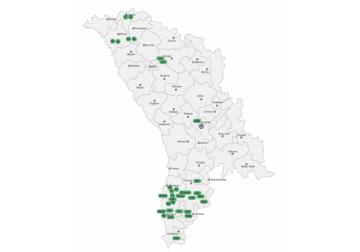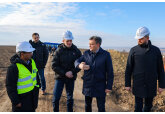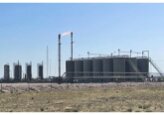
Moldova intends to use the geothermal sector to reduce its dependence on energy imports, and investments in the development of this sector are estimated at 300 million euros over 12 years - Energy Ministry
According to the Ministry, Moldova's geothermal potential has been systematized in a study, which also proposes a strategy for the sector's development until 2035. According to the document, geothermal energy has the potential to play a significant role in Moldova's energy balance. By realizing this strategy, Moldova can reduce its dependence on external energy sources, contribute to the fight against climate change and stimulate sustainable economic development. The paper examines existing wells and their technical documentation from the archives of the Agency of Geology and Mineral Resources and concludes that surface geothermal sources can be used to provide thermal comfort in residential, commercial or industrial buildings, as well as to cool premises during the hot season, using the same infrastructure. At the same time, deep geothermal sources can be used to produce heat for urban networks and for industrial purposes (processes using steam, hot air or hot water), agricultural purposes (greenhouse heating, fish farming, drying), aquatic purposes (swimming pools, aquatic centers, steam baths). Surface geothermal energy is an efficient and sustainable technological solution that utilizes geothermal resources at temperatures below 30°C available at depths of less than 400 meters. Deep geothermal energy utilizes groundwater layers with temperatures between 30°C and 200°C at depths between 500 and 3000 meters. The paper proposes to implement a series of pilot projects for urban heat and geothermal power generation in 2027-2029, and to test the integration of geothermal systems with existing energy infrastructure. These are wells in Chisinau municipality (Ghidighici, Chisinau street - water temperature in the well reaches 53°C at a depth of 1140 m), in Cahul (depth of 500-600 m) and wells in Gura Cainarului and Marculeshti villages, Floresti district. It is planned that in 2030-2033 the expansion of geothermal heating systems in cities and villages will follow, as well as the construction of new geothermal power plants. The estimated costs for the development of the geothermal sector are approximately 300 million euros over 12 years, which also includes the construction, installation and/or modernization of the necessary thermal heating infrastructure. At the same time, the authors of the documents suggest conducting a number of geological and economic studies, developing a comprehensive map of geothermal resources, and creating a legal and regulatory framework. The study was supported by UNIDO (United Nations Industrial Development Organization) and the Global Environment Facility. It is available on the website of the Ministry of Energy. // 24.02.2025 - InfoMarket.







